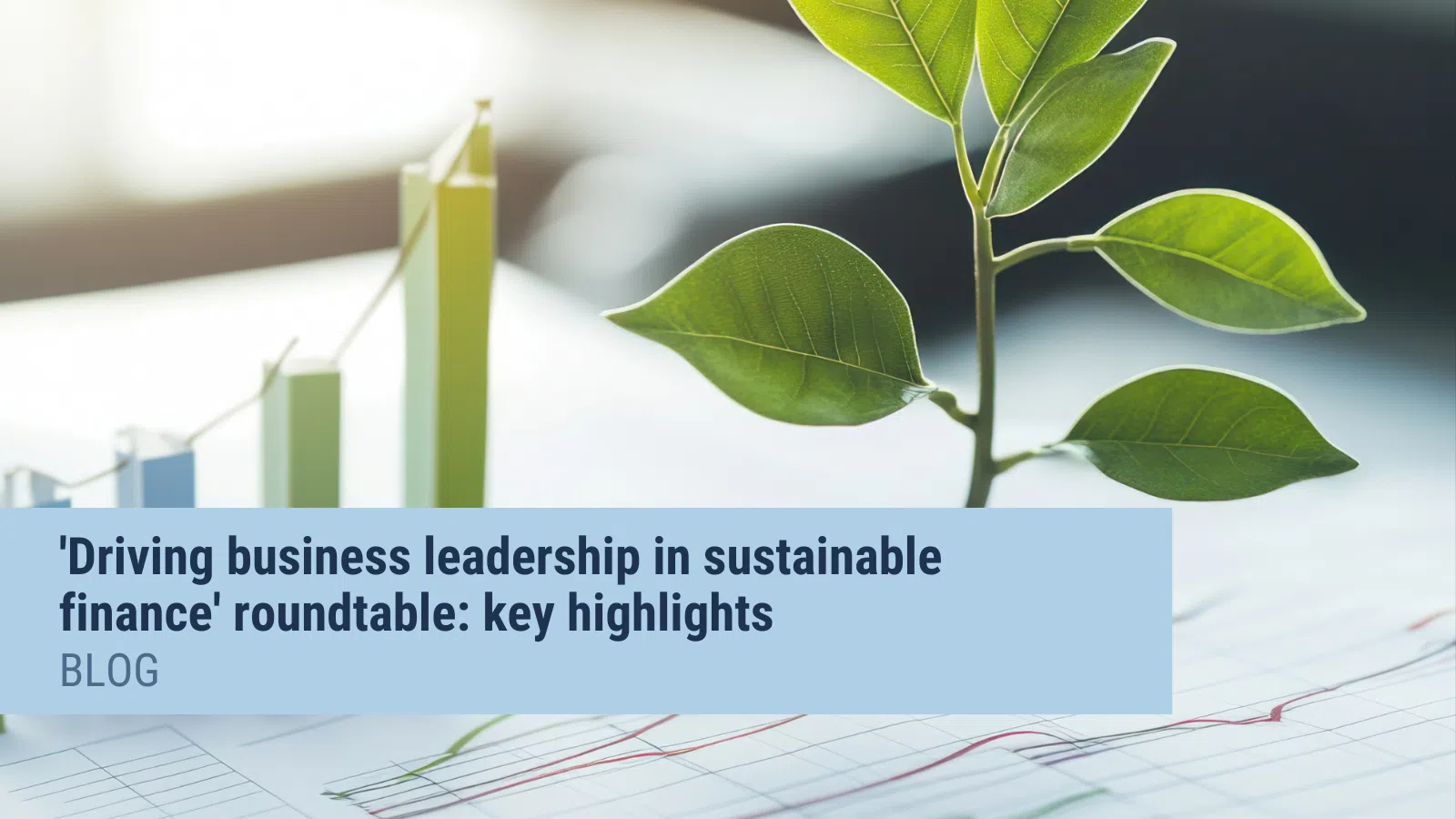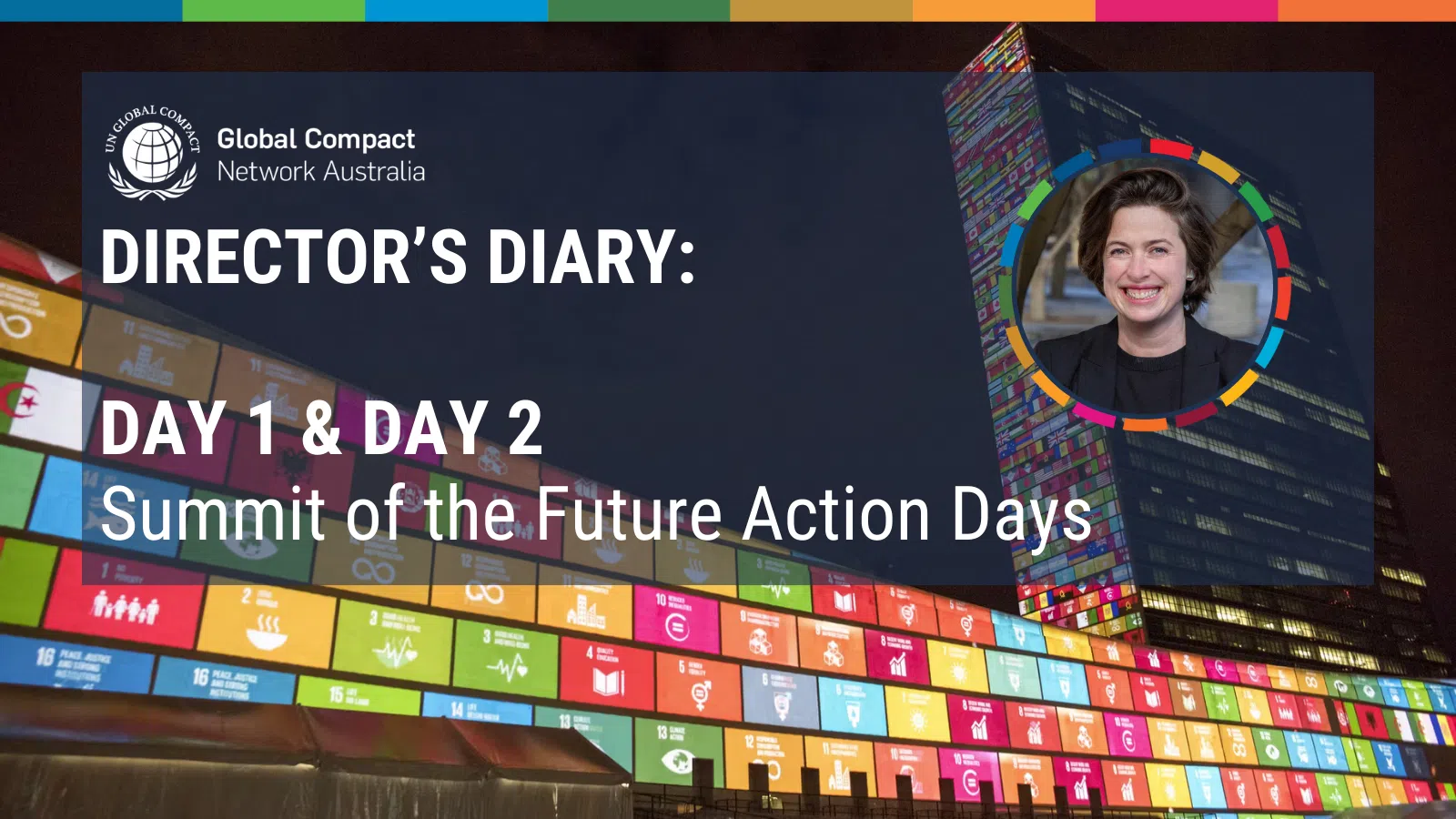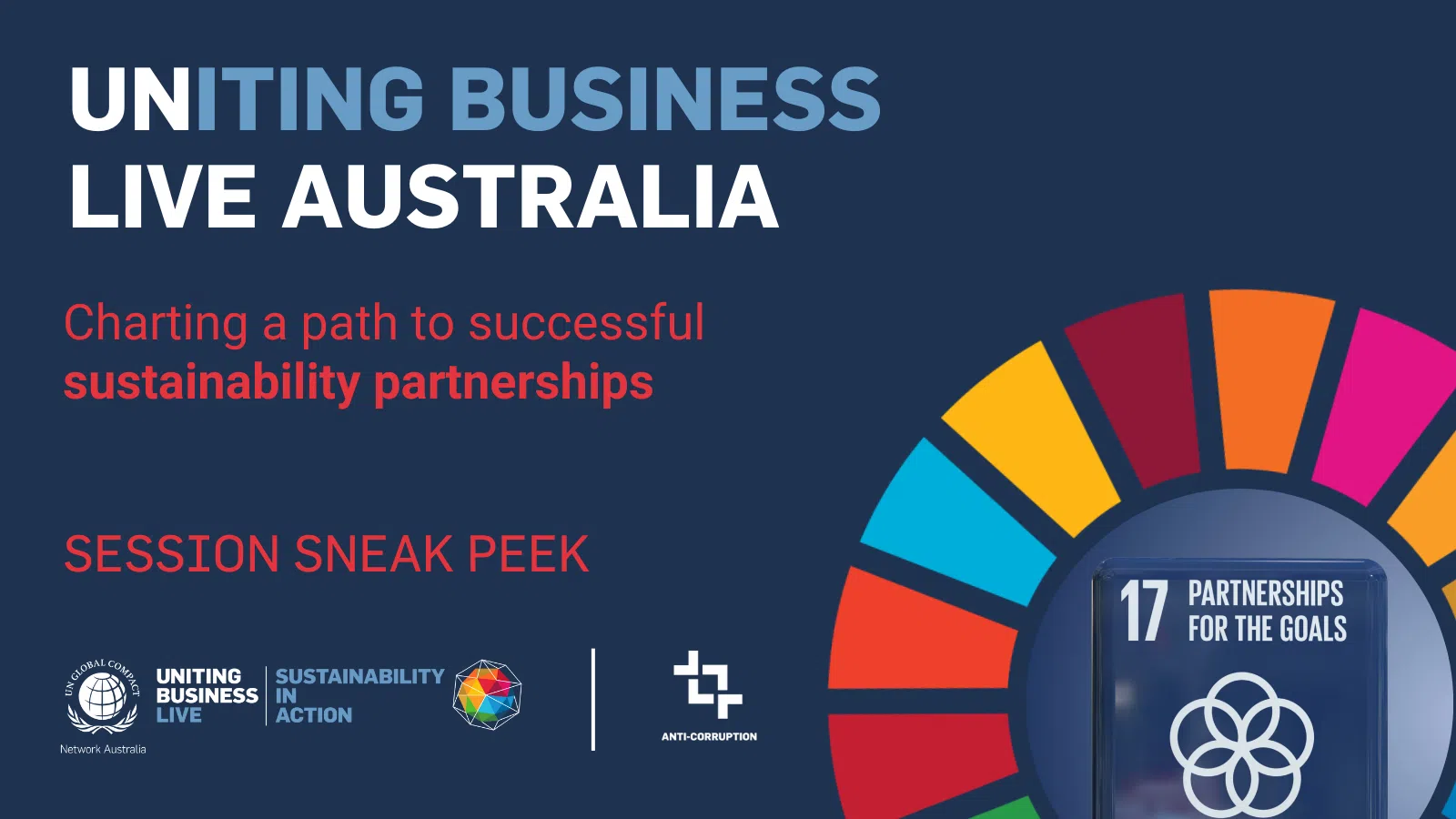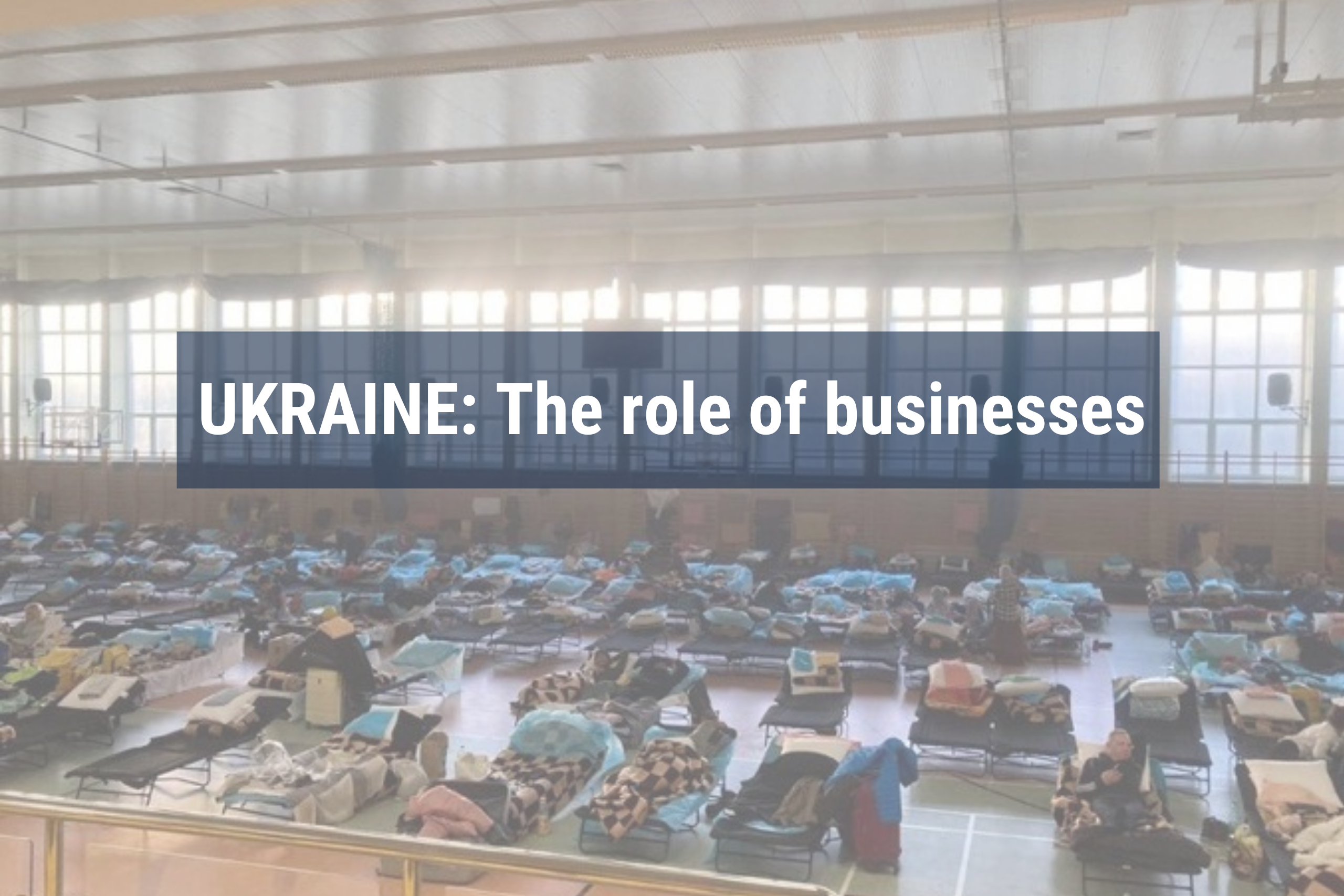
Blogs, Environment & Climate Change, Resources
‘Driving business leadership in sustainable finance’ roundtable: key highlights
Dr Evan Center | October 29, 2025
As part of the Executive Roundtable Series, the UN Global Compact Network (UNGCNA) teamed up with the Principles for Responsible Investment (PRI) and convened Australia’s leading businesses and investors as part of the Leadership Roundtable Series, with this session titled Driving business leadership in sustainable finance. Hosted by Lander & Rogers in Melbourne, the roundtable addressed the Australian opportunity to establish itself as a key regional source for climate finance.
Global investors, businesses and policy makers are increasingly aligning business and investment decisions that adhere to the 1.5C goals of the Paris Agreement and the nature-positive targets of the Kunming–Montreal Global Biodiversity Framework. As expressed by UNFCCC Executive Secretary Simon Stiell at our previous roundtable events: “A 1.5C world is best for business.” By addressing climate action gaps and unlocking climate solutions, businesses and investors can both mitigate future risks and position themselves for a resilient future.
Driving business leadership in sustainable finance
The Driving Business Leadership in Sustainable Finance roundtable brought together 35 business, investment and peak-body leaders to provide actionable strategies for capital deployment, credible transition planning, and adoption of an Australian taxonomy and mandatory climate disclosure. The roundtable, featuring Global PRI CEO David Atkin, and moderated by UNGCNA Board Chair, Fiona Reynolds, addressed the integration of nature and climate considerations, practical climate disclosure, policy clarity, and effective public communication. To enhance capital mobilisation and accomplish quantifiable climate and sustainability outcomes, the session emphasised the importance of transitioning from reporting to implementation.
UNGCNA Executive Director, Kate Dundas remarked that, “the roundtable was a great way to bring business leaders and investors together to focus on what is required to unlock capital for Australia’s transition to a net-zero, nature-positive economy. Discussions reinforced that a credible national transition story, clear policy direction, and consistent disclosure standards are essential to attract investment and strengthen confidence in Australia’s sustainable finance landscape.”
PRI Oceania and Asia (excluding China and Japan) Regional Head, Kar Mei Tang, added that “private capital plays a critical role in driving long-term value and advancing Australia’s sustainable finance agenda. Delivering on national transition goals will require clear policy direction, credible frameworks, and collaboration between investors, business, and government.”
Roundtable takeaways
- Transition from reporting to implementation: The discussion underscored the necessity of transitioning from disclosure frameworks to measurable implementation. Businesses should turn sustainability reporting into credible transition plans, precise performance indicators, and integrated capital allocation.
- Policy certainty as an investment enabler: Many roundtable participants expressed the significance of consistent and transparent policy direction. Investors will be granted clarity, and capital mobilisation will be enhanced by the implementation of a national sustainability taxonomy and mandatory climate disclosures.
- Simplified and relevant reporting: Comparability, materiality, and clarity were expressed as the primary focus of reporting frameworks. Reducing complexity will improve efficiency and guarantee that reporting is used to support decision-making rather than administrative compliance.
- Integration of climate and nature action: Several roundtable participants suggested the need to address climate and biodiversity issues in a collaborative manner. The implementation of place-based land-use planning, the enhancement of access to nature-related data, and the development of TNFD-aligned capacity will enhance the effectiveness of investment outcomes and risk management.
- Redefining sustainability narrative: The discussion suggested that an emphasis should be placed on the economic and operational results of sustainability communication. Aligning business objectives with community and market expectations can be achieved by presenting renewable energy as both affordable and dependable.
Closing the credibility gap: Insights from UNGCNA & Canbury
With both global and national momentum converging, sustainable finance is entering a decisive phase – one where credibility and execution, not just ambition, defines leadership.
A recent report by Canbury and commissioned by the UNGCNA, titled From pledges to pathways, was developed for the UNGCNA & PRI Driving business leadership in sustainable finance roundtable found that there are important opportunities for businesses and investors who are credibly driving climate action:
- Companies with validated 1.5°C-aligned pathways and capital alignment enjoy lower cost of capital, stronger investor demand, and more resilient supply chains.
- Early movers are already differentiating through transition plans, value-chain decarbonisation and climate-linked executive incentives.
However, credibility gaps remain for most Australian corporates:
- Only 8% of large corporates have 2030 objectives that are 1.5°C aligned, and only 12% of those have verified them, even though 83% of them have board-level climate oversight and 55% have published transition plans.
- Scope 3 coverage is particularly inadequate with just 25% of businesses report thoroughly.
- There is weak capital alignment and a lack of private sector understanding of material nature risks.
Additionally, capital alignment is deficient:
- Only 12% of asset owners disclose low-carbon CapEx, and only 5% indicate credible portfolio transition coverage.
Ultimately, the report recommends actions for Australian business to close credibility caps and capture regional leadership:
- Strengthen Target Credibility: Set 1.5°C aligned 2030 targets and seek external validation through frameworks like the Science Based Targets initiative (SBTi).
- Integrate the Value Chain: Progressively measure and expand reporting of all material Scope 3 emissions within both interim and long term targets.
- Align Capital & Accountability: Disclose the percentage of capital expenditure aligned with low carbon activities and link a material portion of executive pay to climate KPIs.
- Incorporate Nature: Publish transition plans aligned with the TPT framework and develop a clear nature strategy guided by the recommendations of the TNFD.
Conclusion
As the world approaches COP30 in Belém, there is a pivotal moment for climate finance, and Australia’s implementation of policies illustrate how national systems can utilise private funding for sustainable transition strategies.
As the UNGCNA continues to convene leaders through its Executive Roundtable Series, we remain focused on translating commitments into implementation – mobilising private capital, strengthening credible transition frameworks, and accelerating Australia’s progress towards a net-zero, nature positive, and economically resilient future.
Resources
UNGCNA & Canbury Publication: From pledges to pathways: The Australian leadership opportunity
PRI, COP30 & Sustainable Finance: The PRI’s key objectives at COP 30
UNGCNA Forward Faster Initiative: The Forward Faster initiative of the UN Global Compact enables businesses to accelerate the advancement of the Sustainable Development Goals by 2030. It focuses on five key areas which are gender equality, water resilience, finance and investment, climate action, and living wages. Participating organisations are required to establish quantifiable objectives, disclose their progress annually, and incorporate sustainable practices into their operations.
Authors: Rishika Salvadi, Environment and Climate Change Intern, UN Global Compact Network Australia; Dr Evan Center, Senior Manager, Environment and Climate Change, UN Global Compact Network Australia.


